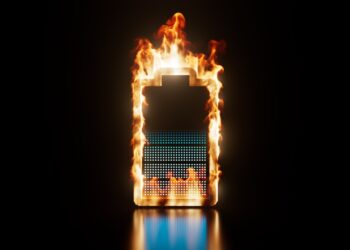A growing threat in the e-scrap sector received national analysis this week, when The Washington Post visited a processing facility and explored the danger of lithium-ion battery fires.
The newspaper visited ITAD company Cascade Asset Management in Wisconsin, where employees demonstrated device dismantling and showed how lithium-ion battery fires can occur. The column featured interviews with Cascade CEO Neil Peters-Michaud and HOBI International President Craig Boswell.
It published a day before Apple’s annual product launch event, during which three new iPhone models were announced. The column was picked up by media outlets all over the country.
Besides battery fires, the piece touched on right-to-repair issues, product design, material sourcing commitments and more. The U.S. Public Interest Research Group (U.S. PIRG) and iFixit.org both praised the write-up for highlighting right-to-repair issues.
Earlier this year, E-Scrap News wrote about the battery fire problem in e-scrap facilities. Peters-Michaud and Boswell described their company procedures for dealing with batteries that ignite, otherwise known as “thermal events.”
Although the events are a major safety hazard, Peters-Michaud noted that they are relatively infrequent. Cascade handles about 100,000 batteries per year, he said, and in a recent year the company experienced just two battery fires.
Resource Recycling, sister publication to E-Scrap News, also reported on the rising instances of battery fires in materials recovery facilities (MRFs), where curbside recycling programs send collected material. Lithium-ion battery fires pose an “existential threat” to MRFs, one expert said.
Lithium-ion battery issues will be explored in detail during a concurrent session at the 2018 E-Scrap Conference, which will be held next month in New Orleans.
Photo credit: Sharaf Maksumov/Shutterstock































